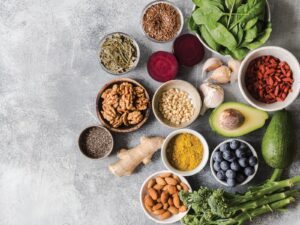In my line of work I hear complaints about inflammation and pain all day long. I’ve had many women come in complaining of spontaneous joint pain and body aches they’ve not experienced before and how debilitating it can be. Many are on prescription drugs and others try alternative therapies to help alleviate the inflammatory process thus reducing the pain. Exactly how biochemical processes cause chronic inflammation is not yet fully understood, but we do know that women and older people suffer more inflammatory illnesses. Let’s explore how hormonal imbalance may lead to chronic inflammation and disease.
First of all, inflammation is classically defined as a protective reaction by the body in response to some physical or chemical injury. It is the first step in the healing or repair process after an injury or stress. However, chronic inflammation is an abnormal condition that can cause or is associated with poor health and disease. There are many factors that contribute to chronic inflammation in the body including environmental toxins, poor diet, drugs, increased weight, and stress. Researchers also believe that inflammation is a particular issue for women during and after menopause. Inflammation caused by hormonal imbalance could be a reason why women suffer 75% of all autoimmune disease.
Estrogen
As women approach menopause, typically between the age of 45 and 55, their bodies go through radical hormonal fluctuations that can affect them in many ways. Changing levels of estrogen, progesterone, and testosterone have a role to play in age-related inflammation. Researchers believe that the declining levels of estrogen play a major role in joint pain during menopause. It appears that a decrease in estrogen corresponds with a rise in the cytokines interleukin-1 and interleukin-6 (pro-inflammatory chemicals). Estrogen affects joints by keeping inflammation down; therefore, as estrogen levels begin to decline during peri-menopause, joints get less and less estrogen, and pain is often the result.
The hormonal changes leading up to menopause also contribute to weight gain. There is clear evidence that extra fat cells, especially around the middle of the body, add to systemic inflammation by creating extra cytokines and C-reactive protein (chemicals in the body that promote inflammation).
Cortisol, Insulin and Thyroid
Cortisol, the stress hormone produced by the adrenal glands directly influences insulin levels and metabolism. A depletion of cortisol is often implicated in furthering a pro-inflammatory state. Cortisol, like insulin, is required for energy metabolism. It is also produced in large amounts in response to an acute short-term stress, such as an infection. Thus, cortisol response must be enough to handle short-term inflammation.
After the stress and inflammation pass, the body’s “fight or flight” hormones quickly return to normal. The problem with cortisol occurs when the inflammation doesn’t stop. Constant stress means constant secretion of cortisol and as the body adapts to chronic stress, you become hyperinsulinemic, thereby creating more visceral fat since insulin promotes fat storage. This fuels more cortisol secretion which results in a vicious cycle of stress and weight gain, creating chronic inflammation.
As we age, the body’s hormonal balance favors excess cortisol as the counterbalancing levels of estrogen and testosterone drop. The resulting chronically high cortisol levels take a heavy toll on the body from insulin resistance to reduced immune system function. Excess cortisol is also associated with a low level of thyroid hormone. This is why many people have trouble losing weight, have chronic infections, fatigue, and a wide variety of other conditions that may further compound the effects of inflammation.
Insulin is a hormone produced by the pancreas in response to food in our stomach. Because of our modern-day diet of low-fat, highly processed, and refined foods, the pancreas keeps pumping out more and more insulin. This excess of insulin functions as a pro-inflammatory substance. Eventually we become resistant to all this excess insulin in our blood. Another words, the body needs more and more of it to do the same job it once did with far less. This insulin production system spirals out of control creating inflammation and oxidative stress. This ages the brain, leading to what is now called type 3 diabetes (aka Alzheimer’s).
In The Anti-Inflammatory Zone, Barry Sears, PhD, wrote that underlying hormonal changes occur when inflammation persists in the body, and that these changes then perpetuate the body’s inflammatory response. Dr. Sears says that eating the wrong type of fats and too many carbohydrates causes overproduction of two hormones: pro-inflammatory eicosanoids and insulin. High levels of these hormones then cause the body to produce more cortisol which furthers more inflammation.
Tips on How to Lower Inflammation and Balance Hormones
- Get tested if you’re between the ages of 35-45 to know your baseline hormones. This will help you see where your imbalance lies in order for you to help your body restore what’s dipping or missing.
- Add an adaptogenic herb like Relora or Ashwagandha to help the body adapt to stress. Adaptogens improve the entire body’s resistance to stress and create balance and harmony in the body, thereby reducing inflammation and balancing hormones
- Eat your vegetables! Vegetables contain hundreds to thousands of phytonutrients (plant hormones) that have a hormone-balancing effect in the body. Vegetables also contain fiber that binds itself to old estrogens, thereby clearing them out of the system, leading to lower inflammation and better hormonal balance.
- Remove inflammatory foods from your diet, such as processed dairy, gluten, alcohol, sugar, processed snacks, omega-6 oils, and soy. These can incite inflammation and create hormonal imbalance. Food insensitivities and inflammatory food can lead to leaky gut, inflammation, and systemic imbalance, which in turn can put hormones in flux.
- Eat healthy fats like: coconut oil, avocados, olive oil, and grapeseed oil. Steer clear of vegetable oils, peanut oil, canola oil, soybean oil, cottonseed oil, sunflower oil, margarine, shortening or “spreads” (these are all high in omega 6 fats)
- Watch for endocrine disruptors or hormone disruptors like plastics, air fresheners, dishwashing soap, laundry detergent, cleansers and cleaners, cosmetics, deodorants, toothpaste, and lotions.
- Don’t do long cardio sessions. Opt for short interval training. Long cardio sessions can actually lower your thyroid function and increase cortisol and inflammation. Interval training increases your HGH (Human Growth Hormone) and slows aging.
- Avoid all-day caffeine! Excessive caffeine raises your cortisol and slows down your thyroid.
- Take your vitamin D. Low vitamin D levels are linked to slow stomach emptying and bile production, inciting inflammation and triggering hormone disruption.
- Relax more. Help yourself lower the inflammation from within by just breathing more, sleeping more and allowing yourself to take a break. Our lives are dictated by work, family, drugs, and technology. In order to heal, we have to take a break from it all to catch our breath and put out the fire.
























